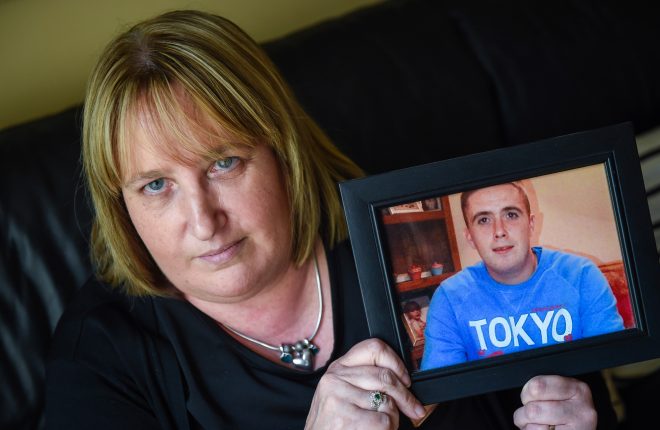
Mary Monaghan with a picture of her son Paul who died in 2014 RMG88
Christmas can be a painful lonely time of year when someone has suffered a bereavement and particularly when someone has been bereaved by suicide. It is often a time when people gather with friends and family and the absence of a loved one may be felt more intensely.
Mary Monaghan, who lost her son Paul to suicide, faces her third Christmas without him at the Christmas dinner table.
“Suffering a loss by suicide is hard one of worst pains ever, and I am finding the run up to Christmas so hard this year. I struggle to keep the mask I wear in place and struggle to get out of bed. I am ordering flowers for a grave when I should be buying presents. I just wish I could sleep to the first of January, but I try do my best for my daughter,” said Mary.
Facing everyday with a pain in her heart, Mary urges those in a similar situation to just do what they can, and look after yourself this Christmas.
“My advice would be to listen to your body and only do what you are able to do. Don’t look at Christmas Day looming, deal with each hour of each day and it won’t be so daunting. Surround yourself with those you love and likewise if you need time alone, please take it. Talk to people about your loved one and make them still a part of Christmas. To anyone who is feeling suicidal talk to someone – be it a stranger, a friend, a relative or professional and remember “it’s ok not to be ok and it’s absolutely ok to ask for help.”
If you choose the suicide route you will pass your pain to your family for the rest of their lives, please seek help you, are worth that,” concluded Mary.
Colette Cullen, Western Trust Suicide Liaison Officer advises anyone struggling this Christmas to talk to someone who can help you see beyond feelings of loneliness and despair.
“There is no right or wrong way to feel or act. It may be helpful to plan well in advance which arrangements will suit your needs and the needs of others who share the loss. There are many ways to spend Christmas and many ways to honour and remember the person you lost.
“You may experience a range of conflicting emotions such as sadness, guilt, excitement, pain, loneliness. Try to be gentle with yourself and accept help and support from people you trust. If you find that you are not coping, talk to someone and don’t be afraid to ask for help from a friend, family member or someone you trust, a faith minister or professional help through your GP.”








